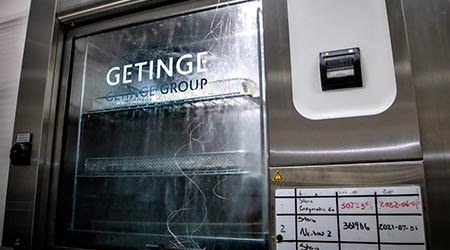
When a medical professional uses a medical device to treat their patient, it is vital there is a known degree of compatibility with the area of patient contact. Otherwise, patients may find themselves subject to uncomfortable reactions or complications. This specific type of compatibility is referred to as biocompatibility. Over the decades, HIGHPOWER has partnered with top-of-the-line biocompatibility testing labs to measure the safety and efficacy of a device following reprocessing. HIGHPOWER can handle your project from beginning to end, performing the various cleaning and sterilization reprocessing steps in your device’s IFU and overseeing the steps needed to document your device’s biocompatibility.
The human body can be sensitive to outside substances or stimuli. As such, undergoing the proper testing is the best way to ensure that your specific device will not cause an unpleasant reaction during any short- or long-term treatment procedure or after the device has been cleaned and sterilized. There are several core components to any risk assessment that biocompatibility testing labs use to determine the required tests and to document overall device safety. These include material toxicology, cytotoxicity, sensitization, irritation, genotoxicity, implantation, and hemocompatibility, among many other tests. Testing typically involves assessing biological tissue after application to determine a reaction. At HIGHPOWER, we offer a thorough approach that yields the most detailed information possible.
Biocompatibility can only be demonstrated for a particular material in relation to a defined set of circumstances, which include the purpose for which it is used and the tissues with which it comes into contact. The consideration of toxicology should be undertaken in the context of the duration of exposure and implications for the actual availability of potential toxicants.
ISO 10993 Annex B describes a continuous process by which a manufacturer can identify the biological hazards associated with medical devices. From here, they can then estimate and evaluate the risks, control these risks, and monitor the effectiveness of the control.

Tests are based on methods outlined in the United States Pharmacopeia/National Formulary, ANSI/AAMI/ISO TIR15499 – Biological Evaluation of Medical Devices – Guidance on the Conduct of Biological Evaluation within a Risk Management Process and the various parts of the ANSI/AAMI/ISO 10993 standard. We work tirelessly to abide by these strict guidelines and ensure that every device is set up for long-term industry success. The process for acute systemic toxicity ISO 10993 is particularly prominent in our industry, and every detail is reviewed to ensure clients receive the most accurate data possible.
HIGHPOWER has many years of experience validating the safety of medical devices, and we are confident that we can help you bring your device to market.
Tests Available by Test Code:
| Test Code | Test Name |
|---|---|
| BIO-CYTO | Cytotoxicity Test—MEM Elution |
| BIO-CYTO-NRU | Cytotoxicity Test—Neutral Red Uptake |
| BIO-GENO | Genotoxicity Test |
| BIO-IRRI | Irritation Test, Intracutaneous Reactivity, 2 extracts |
| BIO-SENS | Sensitization Test, GPMT, 2 extracts |
| BIO-SYST | Systemic Toxicity Test, Acute Systemic Injection, 2 extracts |
| BIO-HEMOL | Blood Hemolysis Test, ISO 10993-4, (NIH Method) |
| BIO-TESTING | Custom Biocompatibility |
By working with HIGHPOWER and our biocompatibility testing lab partners, clients gain access to all the tools needed to gather information about the performance and safety of your instrument or device. If you don’t see your required test in our above list, please contact HIGHPOWER today at clientservices@highpowervtls.com with your inquiry.